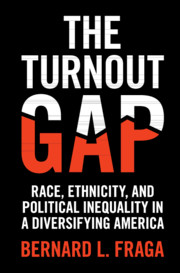Crossref Citations
This Book has been
cited by the following publications. This list is generated based on data provided by Crossref.
Visalvanich, Neil
Schnakenberg, Keith E.
and
Hassell, Hans J.G.
2015.
Race, Representation, and Campaign Finance Networks: The Effect of Party Support on Minority Candidates.
SSRN Electronic Journal,
Phoenix, Davin L.
2019.
The Anger Gap.
Hassell, Hans J.G.
and
Visalvanich, Neil
2019.
The Party's Primary Preferences: Race, Gender, and Party Support of Congressional Primary Candidates.
American Journal of Political Science,
Vol. 63,
Issue. 4,
p.
905.
Hester, Jacob Andrew
2019.
State Laws and Mobilizing College Student Voter Turnout.
Journal of Student Affairs Research and Practice,
Vol. 56,
Issue. 5,
p.
520.
Medenica, Vladimir E.
and
Fowler, Matthew
2020.
The Intersectional Effects of Diverse Elections on Validated Turnout in the 2018 Midterm Elections.
Political Research Quarterly,
Vol. 73,
Issue. 4,
p.
988.
Holbein, John B.
and
Hillygus, D. Sunshine
2020.
Making Young Voters.
Schaffner, Brian F.
Rhodes, Jesse H.
and
La Raja, Raymond J.
2020.
Hometown Inequality.
Shino, Enrijeta
and
Smith, Daniel A.
2020.
Mobilizing the Youth Vote? Early Voting on College Campuses.
Election Law Journal: Rules, Politics, and Policy,
Vol. 19,
Issue. 4,
p.
524.
Stewart, Charles
Alvarez, R. Michael
Pettigrew, Stephen S.
and
Wimpy, Cameron
2020.
Abstention, Protest, and Residual Votes in the 2016 Election.
Social Science Quarterly,
Vol. 101,
Issue. 2,
p.
925.
James, Toby S.
and
Alihodzic, Sead
2020.
When Is It Democratic to Postpone an Election? Elections During Natural Disasters, COVID-19, and Emergency Situations.
Election Law Journal: Rules, Politics, and Policy,
Vol. 19,
Issue. 3,
p.
344.
James, Toby S.
and
Garnett, Holly Ann
2020.
Introduction: the case for inclusive voting practices.
Policy Studies,
Vol. 41,
Issue. 2-3,
p.
113.
Montoya, Celeste
2020.
Intersectionality and Voting Rights.
PS: Political Science & Politics,
Vol. 53,
Issue. 3,
p.
484.
Atsusaka, Yuki
Menger, Andrew
and
Stein, Robert M.
2020.
Why Do Vote-by-Mail Elections Boost Voter Turnout?.
SSRN Electronic Journal ,
Garip, Filiz
2020.
Commentary: Immigrant Vote in the 2020 US Presidential Election.
International Migration,
Vol. 58,
Issue. 5,
p.
281.
Atsusaka, Yuki
2020.
Unifying Demand and Supply-Side Theories of Minority Representation: A Logical Model.
SSRN Electronic Journal,
Gerring, John
and
Veenendaal, Wouter
2020.
Population and Politics.
CARLOS, ROBERTO F.
2021.
The Politics of the Mundane.
American Political Science Review,
Vol. 115,
Issue. 3,
p.
775.
Collingwood, Loren
and
Gonzalez O’Brien, Benjamin
2021.
Is Distance to Drop Box an Appropriate Proxy for Drop Box Treatment? A Case Study of Washington State.
American Politics Research,
Vol. 49,
Issue. 6,
p.
604.
Cantoni, Enrico
and
Pons, Vincent
2021.
Strict Id Laws Don’t Stop Voters: Evidence from a U.S. Nationwide Panel, 2008–2018.
The Quarterly Journal of Economics,
Vol. 136,
Issue. 4,
p.
2615.
Hopkins, Daniel J.
Kaiser, Cheryl
and
Perez, Efren O.
2021.
The Surprising Stability of Asian Americans' and Latinos' Partisan Identities in the Early Trump Era.
SSRN Electronic Journal ,





